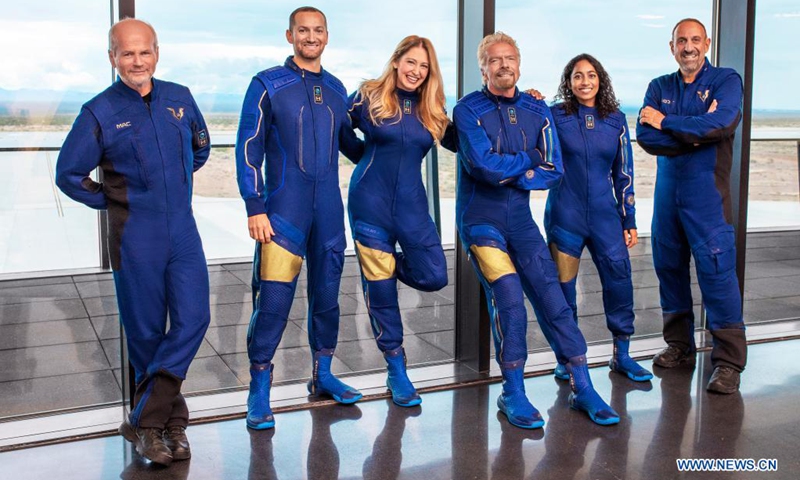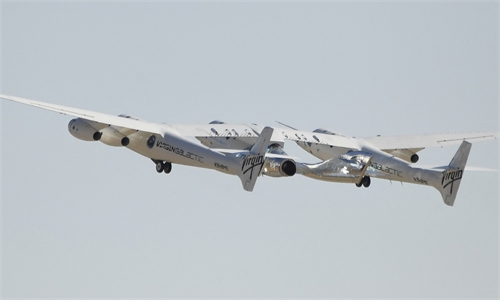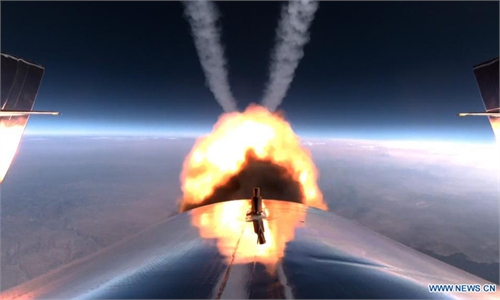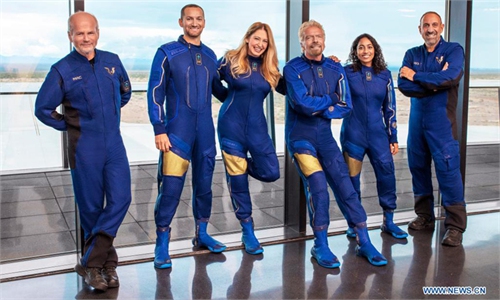
Photo released by Virgin Galactic on July 1, 2021 shows Virgin Galactic "Unity 22" crew (from L to R) chief pilot Dave Mackay, lead operations engineer Colin Bennett, chief astronaut instructor Beth Moses, founder of Virgin Galactic Richard Branson, vice president of government affairs and research operations Sirisha Bandla, and pilot Michael Masucci, posing for a photo in the United States.(Photo: Xinhua)
Increasingly bright prospect of recreational space travel is bound to be catalyzed following the successful space flight by UK entrepreneur Richard Branson, experts said. China, as a major space power, will also push ahead its planning and technical advances on this regard.
Branson on Sunday soared 85 kilometers above the New Mexico desert aboard his Virgin Galactic rocket plane and safely returned in the vehicle's first fully crewed test flight to space, a symbolic milestone for a venture that he started 17 years ago, Reuters reported.
The trip also made Branson the first of the space tourism pioneers to try out their own vehicles, ahead of Amazon's Jeff Bezos and SpaceX's Elon Musk.
Bezos is scheduled to fly on the first passenger spaceflight of his company Blue Origin on July 20, the 52nd anniversary of the Apollo 11 moon landing, media reported.
With the combination of declining space launch costs as more commercial space firms join the club, and advances in satellite technology, the prospect of recreational space tourism is set to grow in the next decade, experts told the Global Times.
More people are taking an interest in space flight to experience weightlessness for a few minutes and have a look of the beautiful Earth below, which Branson described as "experience of a lifetime," despite that at the current phase, it is still out of range for most individuals given the high costs of sub-orbital travel tickets priced around $250,000.
Virgin Galactic said it planned at least two further test flights of the spaceplane in the months ahead before beginning regular commercial operation in 2022. Some 600 individuals have already paid deposits for tickets.
The space economy is estimated to grow to become a $1 trillion market by 2028, according to UBS.
The US has been taking a leading position in the commercial space sector. The upcoming efforts by Blue Origin, the success of Virgin Galactic's crewed flight as well as SpaceX's continuous achievement has opened a new chapter of spaceflight led by private firms.
"Inspired by the progress, I believe that domestic commercial space firms will catch up quickly," Wang Yanan, editor-in-chief of Aerospace Knowledge magazine, told the Global Times on Monday, adding that space travel is also part of a long-term plan for China.
For the sub-orbital crewed flight, as Branson has experienced, the technology gap between domestic firms and Virgin Galactic or Blue Origin is not great. "Domestic private firms could achieve this," said Wang.
China's commercial space industry, which began burgeoning since 2014 when the nation opened up the space sector to private capital, consisting of state-owned players and private firms.
According to Wang, it would be a perfect combination between two sections of the economy to team up on the track of crewed commercial flight, integrating private firms' advantages in costs control, quick speed in technology upgrades and state-owned players' rich experience in launching manned space trip.
In June, China successfully launched the Shenzhou-12 - its first manned mission in five years with three taikonauts aboard. The spacecraft docked with the country's space station core module Tianhe around seven hours after blasting off.
"At the moment, it is crucial for private space firms to improve the reliability of their rockets to ensure safety of space travel since the key to the longer-term success of space tourism is rocket reusability," Wang noted.




